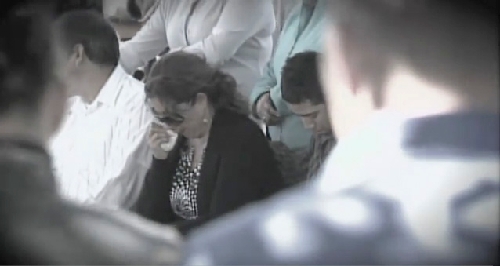Uninspired filmmaking lessens message of ‘8 Murders a Day’ documentary on violence in Mexico

The end never justifies the means.
Except, perhaps, in the case of a documentary such as “8 Murders a Day,” where the urgency of the subject matter goes a long way — but not quite far enough — in justifying the strident, yet uninspired, filmmaking on display.
There’s no mistaking director Charlie Minn’s earnest call to action on what he, and other talking heads, describe as “the greatest human rights disaster in the world today.”
And it’s happening, not in some distant land, but on America’s doorstep in Ciudad Juarez, Mexico.
Just across the Rio Grande from El Paso, Juarez has in recent years, claimed the dubious title of “murder capital of the world,” with a death rate that gives “8 Murders a Day” its title.
That translates to more than 3,000 dead in 2010 — an appalling statistic the documentary seeks to explain.
Sometimes, however, Minn gets in the way of his own arguments — and his own movie.
The official explanation for Juarez’s alarming death toll in recent years: a turf war between two of Mexico’s powerful drug cartels, and Mexican president Felipe Calderon’s war on those cartels.
But, as a succession of talking heads states, restates — and sometimes overstates — there’s a lot more to the story, told in English and Spanish with English subtitles.
A variety of academics, reporters and other observers (including, awkwardly, Minn himself) contend that the vast majority of victims are innocents caught in the crossfire, crushed by misguided, even malevolent government policies that have transformed Juarez into one giant killing field.
A report from an El Paso TV newscast sets the tone for “8 Murders a Day,” as reporter Paul Cicala (formerly of Las Vegas’ own KTNV-TV, Channel 13) roams the site of a birthday party “Massacre in Juarez” (as the on-screen caption dubs it) where 17 victims, mostly youngsters, died at the hands of 20 gunmen. Reporting from the scene, Cicala translates the distraught reactions of shocked family members and helpfully points out to viewers “lots of blood — and, obviously, big holes in the wall from gun shots.”
The pattern continues throughout the documentary, which intersperses still photographs of bullet-riddled victims — and shattered loved ones left behind — with interviews that challenge official explanations of the ongoing tragedy.
Beyond the warring drug lords themselves, several of those featured in “8 Murders a Day” contend that widespread corruption — at the city, state and federal levels — has set the stage for the bullet-riddled free-for-all destroying Juarez.
Those with enough money to get out move across the border to El Paso, which had fewer murders during all of 2010 than Juarez averaged per day, according to the movie. Those without money (including locals working for slave-level wages at U.S.-owned maquiladoras) will do anything — including joining the drug cartels — to help feed their families. And those in the middle are being squeezed, sometimes to death, by both sides.
As leathery, plain-spoken writer Charles Bowden — the source of many of the movie’s most pungent comments — puts it, “It’s like deciding, do you want to be eaten by a lion or a tiger?”
Assorted academics and authors provide context for the documentary’s arguments. But it would certainly help if Minn had explained what makes them such experts.
For example, Bowden — a former reporter for the Tucson Citizen who’s written for magazines from GQ to Harper’s to Mother Jones — is the author of the book “Murder City: Ciudad Juarez and the Global Economy’s New Killing Fields.” But you’d never know any of that from watching “8 Murders a Day” — and any documentary that makes you research the credentials of its talking heads simply isn’t doing its job properly.
More strikingly, interviews and ride-alongs with newspaper and TV journalists suggest the lethal price everyone in Juarez pays for living with death on a daily basis.
But it’s the living victims who make the greatest impact — mothers of murdered children, pleading for somebody, anybody, to help them in their quest for justice.
In one particularly chilling surveillance-footage sequence, for example, we witness a murder victim’s mother staging a protest on the steps of the state capital until a car drives up, discharging an unidentified assailant who proceeds to shoot the woman in the head.
Powerful footage indeed, yet Minn doesn’t do much more than assemble and present such gut-punch imagery.
He also makes sure to include several scenes that show him in action — and, even more shamelessly, promoting “8 Murders a Day” on TV talk shows. (Maybe he was desperate to pad the documentary to reach a 90-minute running time.)
Truly inspired documentaries deepen our insights through their cinematic artistry. (The recent “Hell and Back Again,” for example, compellingly juxtaposes combat and homefront footage to depict a wounded Marine’s battle to readjust to peace after the intensity of the war in Afghanistan.)
But “8 Murders a Day” never goes beyond piling up evidence and presenting arguments.
All of which is certainly enough to make us think — but it’s almost in spite of, not because of, the movie itself.
Contact movie critic Carol Cling at ccling@reviewjournal.com or 702-383-0272.
Review“8 Murders a Day”
90 minutes
NR; violence, disturbing images, mature themes, profanity
Grade: B-
at Village Square












